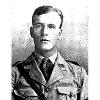Rodger, William (1895 - 1918)

Lieutenant, Royal Engineers
Buried at New Kilpatrick Cemetery
Commemorated at Hillhead High School
Lieutenant William Rodger was the only son of Mr. and Mrs. William Rodger, 1 Partickhill Road. Of courteous manners and attractive personality, he was a great favourite both with teachers and classmates. He impressed all with whom he came in contact with his ability, strength of character, and devotion to duty, and he seemed clearly marked out for a career of success and usefulness. School games did not make much appeal to him, but he was fond of the open air, and was a keen lover of Nature, and a shrewd observer of its changing aspects and moods.
On leaving School he entered Glasgow University as a student in engineering. There he had a most successful career, passing his B.Sc. degree in mathematics, natural philosophy, and geology with special distinction. In 1913 he gained a Strang Bursary in civil engineering and 2nd prize in mathematics. The following year he gained the Muir Bursary and a prize in English. Early in his University course he joined
the O.T.C. When war began, however, he did not wait for a commission, but, together with some fifty more of the corps, enlisted as a private in Lochiel's Camerons.
We cannot prize too highly those ardent and unselfish spirits who choose "the instant path," and put ease and comfort behind them in pursuit of an ideal. Private Rodger, with his fine record and gallant bearing, was soon singled out for a commission, and in May, 1915, proceeded to France as a subaltern in the Argyll and Sutherland Highlanders. When the Macedonian expedition was projected in
the autumn of 1915 he was sent to Salonica, and attached temporarily to the R.E. There he found his metier, and was recommended for permanent service in the Engineers.
He returned to Chatham for a three months' course in military engineering. In November, 1916, he went to France once more, when he saw much service with a field company. In July, 1917, while building bridges at Nieuport, Belgium, under heavy shell fire, he was badly gassed, and was invalided home. He never fully recovered from the effects of this poisoning, and on the 1st November, 1918, while still in hospital, he died of pneumonia, following influenza.
In him the country has lost a very gallant gentleman and a most useful citizen.




